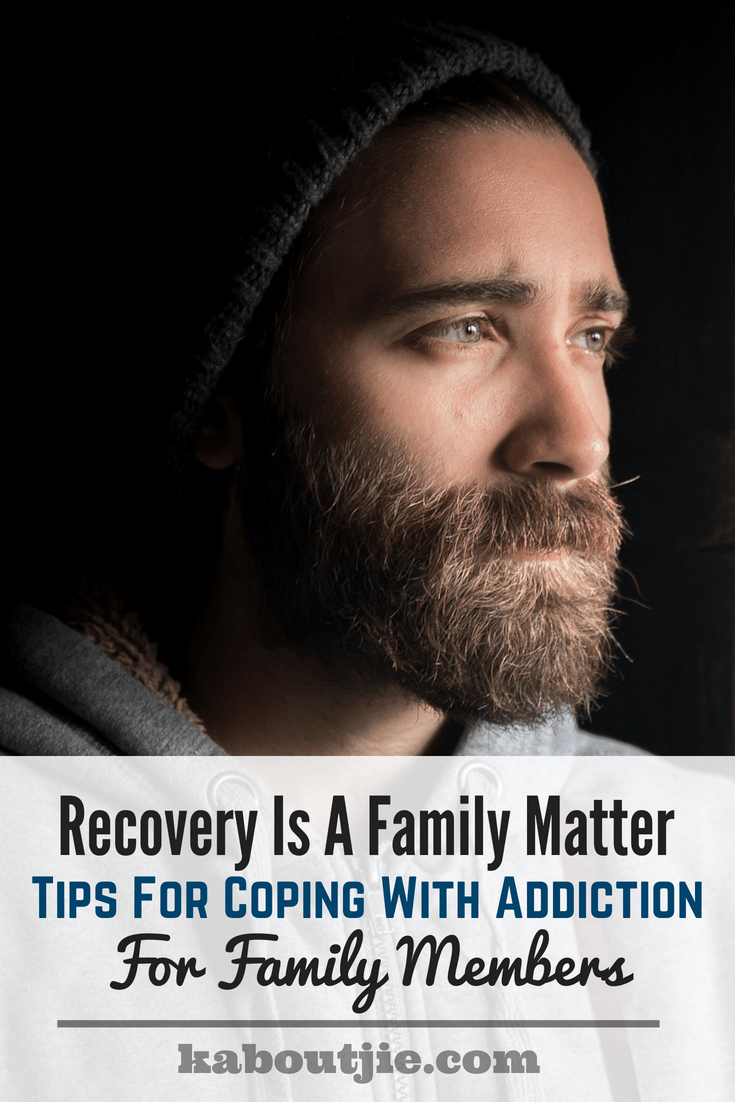There’s a lot of focus pulled toward providing treatment to addicts, helping them stay sober, and overall better understanding of the whys and hows of addiction, but the families of addicts often get the short end of the stick in the matter.
More often than not, they don’t get enough – if any – attention and guidance they need to get through the crisis and come out the other side stronger than before.
In hopes of changing that, here are some essential tips for family members coping with addiction.

Why Addiction Is A Family Matter
No matter what your relationship with the addict is – whether they’re a spouse, your child, or a relative – you can probably tell by now that their addiction has a profound impact on how your family works. Addiction is a disease that affects the family as a whole, not just one person struggling with it – everyone involved will suffer in their own way.
That’s why you should be there for the recovery – it’s not only about fighting the addiction but about healing as a family, too. You being there, supporting them, could be a vital part of their commitment to sobriety.
Your “job“ doesn’t end the moment your loved one enters rehab, though. It is a lifelong process, full of ups and downs. There will probably come a time when you’ll feel like giving up, too, and in times like that, you have to remember the love you have for each other – remind yourself that everything else might come and go, but family is forever.
As long as you turn to each other for support, it can get better.
5 Tips To Help Family Members Coping With Addiction
So, what can you, as a family, do to cope with all the hardships of addiction?
To answer that, here are five tips for family members coping with addiction you should know about:
1. Education About Addiction Should Be Your First Step
Denial and ignorance are pretty much the ideal environments for addiction to not only develop, but thrive, as well. That’s why the first bit of advice to all the families out there who have a loved one suffering from addiction is to educate themselves.
By that, I mean more than just reading about the symptoms – although that can help in recognizing „red flags.“ Educate yourself on how the addiction affects the brain, how to make sure the addict stays healthy during detox (in case of alcohol addiction, learning how to use a blood pressure monitor can come in handy), and what your role is in their recovery.
Every piece of knowledge you gather along your way will help put you, as a family, on a path of healing.
Some will find peace and healing through educating others, as well. If you feel like you might be one of them, let me assure you that’s one of the healthiest coping mechanisms out there. So, don’t be afraid to speak up and be a part of the change – you never know, maybe there are other families out there that can find solace in your words.
Click here for 12 Children’s Books That Discuss Substance Abuse.

2. Don’t Be Ashamed To Seek Professional Help
You can do everything in your power to try and help the addict, and often it still won’t be enough – and that’s perfectly okay.
Addiction can cause insurmountable stress for you to handle on your own, but the thing is, you don’t have to go through it alone. Family therapy can help you learn some healthy coping mechanisms, and transform a family driven apart with guilt and anger into a tightly woven unit that it once was.
And while you’re doing your best to help your loved one fight the addiction, it’s easy to forget to look after your well-being in the process. What I’m trying to say is:
It’s okay to take time for yourself, and a great idea to have private sessions with a therapist to work out any issues, such as stress and depression, that you might be carrying bottled up inside.
3. No Shaming And Judgement – Keep In Mind Addiction Is A Disease
You may feel angry and confused as to how it came to this, but try to refrain yourself from shaming and judging.
For an addict to feel like they are a disappointment to the family won’t benefit anyone involved. Judgment might yield results, just not those you were hoping to achieve. Instead of helping them, that will only lead to further lowering their confidence and self-image, and, in turn, encourage them to turn back to their addictive behaviors.
Remember, the goal is to end that vicious cycle.
Don’t let the frustration get the best of you. Addiction is a disease, and if you wouldn’t shame your loved one for having any other type of illness, now’s not the time to start, either.

4. Stay Realistic – There Are No Easy Fixes
Your loved one has entered treatment, so it’s smooth sailing from now on, right?
I’m sorry, but no, that’s not how addiction works. Recovery takes time and staying sober takes dedication that will probably remain unfathomable to anyone who hasn’t been an addict themselves.
I’m not saying this to discourage you. I’m saying it to help you understand that there’s a long road ahead of you as a family, and you should appreciate every step you take. No matter how small or irrelevant it might seem, it’s progress, and at the end of the day, that’s all that matters.
You won’t return to being a picture-perfect family right away, but that doesn’t mean you can’t enjoy your time together. Recovery is hard work, it’s messy, and it takes time. Don’t make it any harder on yourself, or the addict, by having unrealistic expectations.
Remember:
If recovery were as simple as telling someone to stop doing it, addiction wouldn’t be a disease that’s plaguing our society as a whole.
5. Don’t Ever Blame Yourself – You Did Nothing Wrong
Lastly, I want you to remember that you did nothing wrong. In the midst of dealing with addiction that’s possibly been tearing your family apart for quite some time now, it’s important to remember not to point fingers – especially not at yourself.
Don’t try to take on a burden that isn’t yours – it won’t help anyone involved. You’re not doing anyone a favor by hosting a pity party for yourself.
Watching someone you love struggle with addiction is heartbreaking, and finding someone to blame for what you’re going through is the most natural thing to do. But when things get hard – and they will make no mistake about it – remember the three C’s:
- Cause: You didn’t cause it.
- Control: You can’t control it.
- Cure: You can’t cure it.
Final Words Of Support To Families Coping With Addiction
I’m not going to lie; there’s a long journey ahead of you – the battle with addiction is never truly over, even if your loved one has reached the state of sobriety.
But as long as you keep these tips for family members coping with addiction in mind, and lean on each other for compassion and support, this will be an experience that will make you stronger than ever – rather than tearing your family apart.
 Kaboutjie SA Mommy Blogs by Lynne Huysamen
Kaboutjie SA Mommy Blogs by Lynne Huysamen





Thanks,my brother is dealing with addiction nyaope to be more specific.am telling you it’s not easy for us a family because were dealing with backlash from community and the trips to the police station and also relatives not wanting anything to do with my brother and us included cause were ever he goes the is trouble.
I’m so sorry to hear about your struggles with your brother. It is not easy getting into recovery, I personally lived in denial for 15 years before managing to get clean. I wish you and your family strength and courage to get through this.
I am the victim of circumstances. I took a huge fall for my family member so as a result ; experience has left me wounded and depressed with anxiety. This is definitely not a pleasant situation because I was and still blamed for something that I wasn’t responsible for.
Addiction is very hard on the family as they have to live though watching their loved one being taken over by this demon.
It really is hard on the family Glynnis! I think about the heartache I cause my family and it makes me so sad. Thankfully I’m clean now for 13 years and I am a sober mom.
i can understand this article so well, i lost my father in law due to alcohol addiction
😥 That is so true. Thank you for sharing
My daughter who sent this to me has
crossed my lines with her recovery truth
as her excuse. We were very close and I
was there for her when she was struggling
so proud of her on one hand and scared on
the other when she went to rehab.
In her eyes since she has been released,
I have failed her. She has told me many things
about myself in the form of name-calling that
I don’t feel described me and I don’t know
where the hostility has come from.
I feel like her new vibe is highly critical.
She’s transformed herself amazingly she’s
doing fantastic but we’re not close at this time.
She’s about positivity, but I feel that she’s
dumping her negativity on me.
It doesn’t make me want to embrace her.
It makes me want to pull away.
that being said, I want nothing but the best for her
and I’m cheering her on.
Coming out of rehab can be really tough, and blaming others and being hostile is a typical trait of addicts, even when clean and in early recovery. My advice is call her out on it and let her know it is not acceptable behaviour. Allowing her to treat you like that is not helping her and it certainly isn’t helping you. If she wants to talk about your short-comings tell her you are more than happy to do so – in a joint therapy session. That way she won’t be able to bully you and she will need to own her part in things. Yes sure you probably did some things wrong, just like my mother did… but nobody is perfect and dealing with someone in addiction is hard. Nobody gets it 100% right so if you are feeling guilty try to let it go.